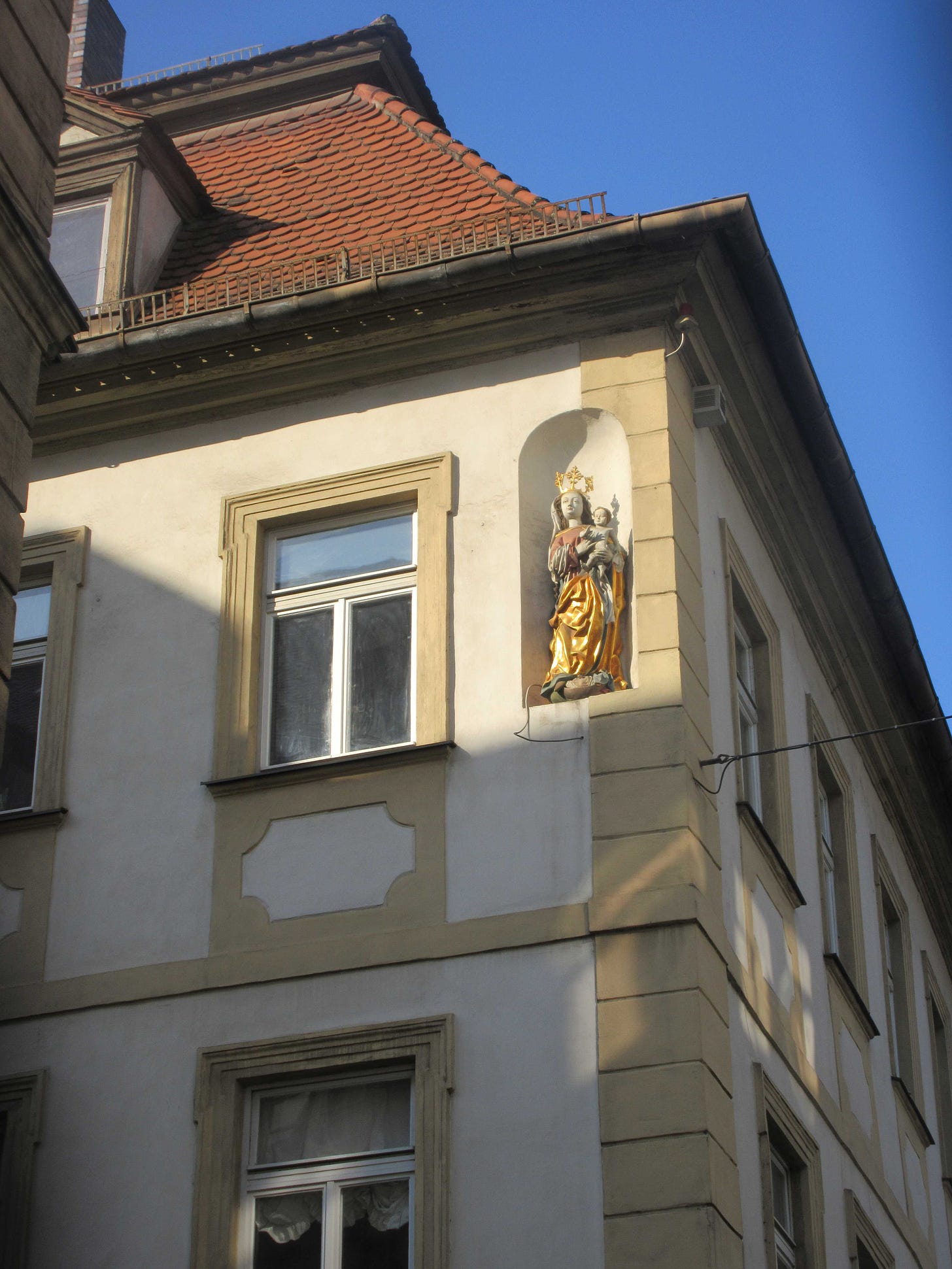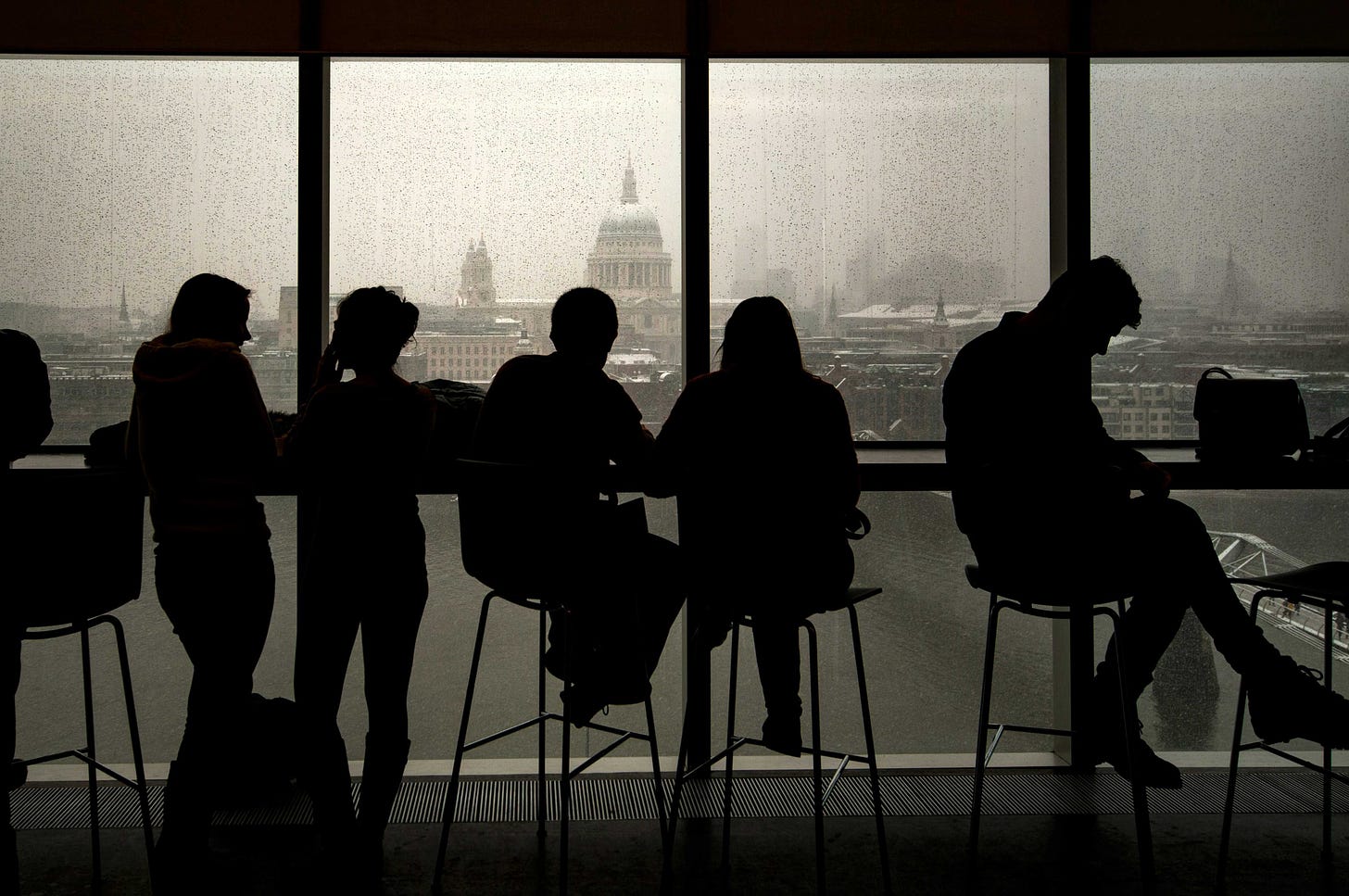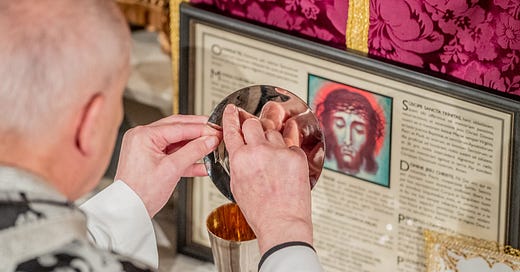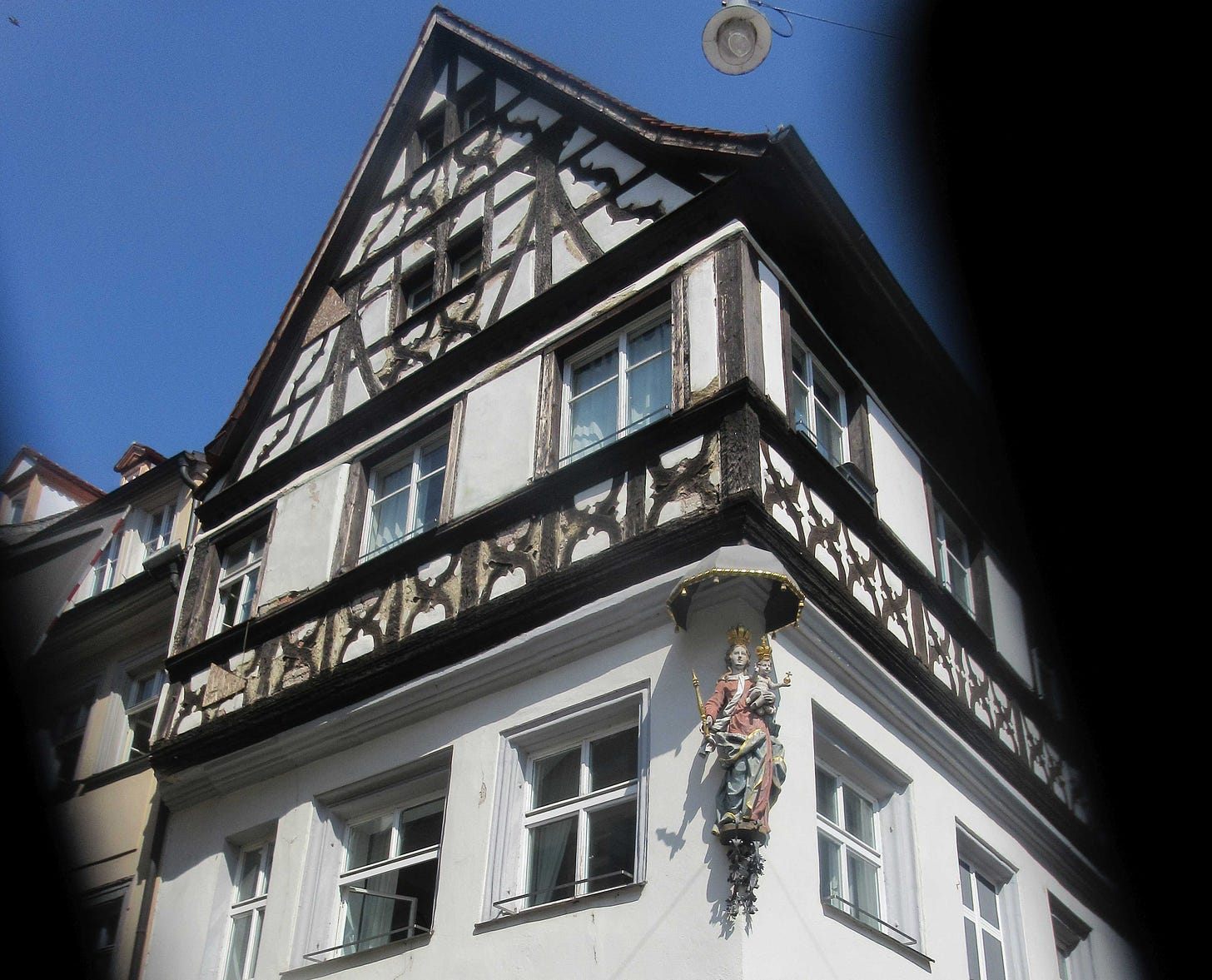Man as a Tradition-Constituted Liturgical Animal
Elevated by the Past: The Normative Role of Tradition in Life (Part 1)
Preliminary Note: If you haven’t already filled out the four-question survey from last Friday, please take a moment to do so here (it’s at the very end of that post). Your last chance, as the survey expires at the end of today.
In an essay consisting of four relatively compact parts, I will explain the ways in which human beings are tradition-dependent creatures; how tradition perfects us as social, cultural, and liturgical animals; how this dependency and perfection are, by God’s design, exemplified in the Catholic Church; and, finally, what happens when individuals and societies rebel against tradition or attempt to do without it. This essay is part of my ongoing effort to articulate the fundamental principles of traditional Catholicism in the face of objections made against it by modern Westerners (and, all too often, by Catholics who should know better).
Catholicism is traditional in essence
Catholicism is inherently a religion of tradition. The Apostle Paul wrote to the Corinthians: “I commend you because you remember me in everything and maintain the traditions even as I have delivered them to you” (1 Cor 11:2), and to the Thessalonians: “So then, brethren, stand firm and hold to the traditions which you were taught by us, either by word of mouth or by letter” (2 Thess 2:15).
In his treatise On the Holy Spirit, published in 375, St. Basil the Great writes:
Of the dogmas and messages preserved in the Church, some we possess from written teaching and others we receive from the tradition of the apostles, handed on to us in mystery. In respect to piety, both are of the same force. No one will contradict any of these—no one, at any rate, who is even moderately versed in matters ecclesiastical. Indeed, were we to try to reject unwritten customs as having no great authority, we would unwittingly injure the gospel in its vitals.1
St. Basil helpfully tells us the sort of thing he has in mind:
To take the first and most general example, who is there who has taught us in writing to sign with the sign of the cross those who have trusted in the name of our Lord Jesus Christ? What writing has taught us to turn to the East at the [Eucharistic] prayer? Which of the saints has left us in writing the words of the invocation at the displaying of the bread of the Eucharist and the cup of blessing? For we are not, as is well known, content with what the Apostle or the Gospel has recorded, but both in preface and conclusion we add other words as being of great importance to the validity of the ministry, and these we derive from unwritten teaching. Moreover, we bless the water of baptism and the oil of the chrism, and besides this the catechumen who is being baptized. By what Scriptures? Is it not by the secret and mystical tradition? Nay, by what written word is the anointing of oil itself taught? And whence comes the custom of baptizing thrice? And as to the other customs of baptism, from what Scripture do we derive the renunciation of Satan and his angels? Does not this come from that unpublished and secret teaching which our fathers guarded in a silence out of the reach of curious meddling and inquisitive investigation?2
Such quotations from the Church Fathers can easily be multiplied. The Fathers see Christianity as a social and hierarchical religion in which the apostles and their successors have been entrusted with dogmas, liturgical practices, and moral judgments that are intended to be passed on faithfully from one generation to the next. They are speaking about the concrete content of the revealed faith as well as the practices that enshrine it and perpetuate it. These we must approach with the right disposition of soul, namely, the humble receptivity of the Blessed Virgin Mary.

Culture as the bearer of tradition
But let us take a step back and ask: Why did Our Lord set things up this way, with tradition as our guide? There are two basic reasons: first, because it harmonizes with our human nature; second, because it harmonizes with the Church as the Mystical Body of Christ, a social body in which the members depend upon one another and share goods with each other not only here and now, but across all the ages, and for all eternity. This supernatural interconnectedness of Christians in the Church is founded on and, to some degree, mimics the natural dependencies of human persons upon their families, neighbors, friends, and compatriots.
Man is a “tradition-constituted animal.”3 The source in human nature of tradition is man’s place in the hierarchy of being: man is more self-transcendent than what is beneath him. Plants have no consciousness at all, so they have no capacity for transcendence. Brute animals do have consciousness, which enables them to be aware of things and of things other than themselves, but their consciousness is confined to material singulars, without the ability to produce out of them a higher synthesis, that is, a continuous texture of time as a field in which thoughts and free actions occur.
Man, in contrast, has the power of rationality that integrates the multiplicity of sense experiences into a tapestry of meanings, intentions, communications, and reflections. Rationality makes possible a true self-transcendence, which allows man to live diachronically (across times), not as an orphan or a prisoner of the moment. Tradition is as natural to man as moral and intellectual virtue, and like virtue, tradition not only makes human life more human and more happy, it carries with it obligations. Just as our rationality implies and impels us to virtue and we are answerable for our vices, so too we have a duty to remain connected to our natural and supernatural heritage.
Man’s reason is, in fact, traditional in nature and cannot be otherwise. We see this in how we learn language—which preexists us as something handed down to us—and how we belong to a family, a people, and a nation, prior to any choice we make as individuals. To enter into already existing bonds of affection with others, to inherit a body of knowledge and wisdom, to be immersed in a culture, is native to rational animals. We can therefore expect grace to build on nature and for the supernatural life to function analogously. We have a heavenly fatherland or patria of which we are citizens; we have a language, customs, rites, doctrines that we receive. As Thaddeus Kozinski puts it:
Authentic traditions, both natural and supernatural, embody and transmit the ultimate realities of man’s existence, the transcendent origin, end, and meaning of things that cannot be grasped by the isolated individual, and cannot be fully rationalized or defined. Ultimate reality must be experienced through and in its incarnation in tradition. It is in this sense that tradition is the eye that allows men to see the spiritual, eternal, and transcendent meanings hidden in the physical, temporal, and mundane facts of everyday existence.4
Kozinski’s words are an apt description of what we mean by “culture,” that is, the shared ways in which a society or people is accustomed to expressing, celebrating, and perpetuating its vision of reality. A Catholic culture is the culture that a society inspired by the Faith will produce and cherish: an environment that turns the mind of man to God, gently and frequently, making a full use of the high beauties of fine art and the rugged genius of folk art, the impressive pageantry of ceremonial and the stabilizing force of rituals. Such a culture shapes the space and structures the time in which we live, work, rest, play, fast, and feast. It points us to common goals and ultimate goals, to personal aims and collective aims.
We can say without exaggeration that we owe a good part of our identity to a certain “collective memory,” the continually renewed remembrance of who and what we are, and all the cultural forms that embody this remembrance. This identity is not primarily conceptual or intellectual but dwells in concrete, visible, audible, tangible expressions that serve as prompts for self-knowledge, incentives for confident action, and supports in turning to God (or returning to Him if we have fallen away).
A fine example of what I have been describing are the shrines found on nearly every streetcorner in Catholic Europe, where a pedestrian is likely to see, as he walks through town, a Madonna and child, a patron saint, an archangel, a crucifix, and so forth. These things do not make someone a believer, but they remind a believer of who he is, whom he should turn to in time of need and pattern himself after at all times. If he has gone astray, such symbols may prick his conscience and induce him to go to confession.
Because man is a rational, linguistic, and artistic animal—born into a family and a people, with a history of which he is a part, and a native language—he is necessarily also a cultural animal. To the extent that he is deprived of a rich cultural inheritance or inherits it only piecemeal, he suffers dehumanization, a denaturing that leaves him feeling incomplete, fragmented, disoriented, unmoored. The inability to draw freely upon a heritage wider and deeper than himself is a serious handicap, a wound, a form of poverty.
In like manner and for much the same reasons, man is a liturgical animal. The liturgy, after all, is the highest rational, linguistic, and artistic activity vouchsafed to us in this life, and also the one most truly social or corporate: it is the activity par excellence of the Church as the family and people of God. It is the most sublime expression of the interiority of man as well as of his sociability rooted in a common history. Since religious rites are not something we make up as we go along but something we are meant to receive as our most valuable possession, it follows that not to receive a rich inheritance of the sacred liturgy from our forefathers is contrary to both our social nature and our supernatural dignity.

Deracinated moderns
In my experience, however, modern Western people, especially those who live in big cities or who live semi-permanently in the subterranean habitat of the Internet, are so cut off from traditional culture and the collective memory that they often look at you with a skeptical eye, or a blank stare, if you tell them that it is better to receive something handed down from tradition than to make it up yourself as you go along. It is by no means obvious anymore to moderns that it is essential, not accidental, to human beings in general—and to Christians in particular—to receive rather than to invent their identity, language, and culture.
While it’s obvious that we inherit much of our identity, it’s also possible for us to try to break away from our inheritance and strike out on our own, like the prodigal son, seeking to “make our own way in the world,” constructing a new culture or a “new paradigm” (as the progressives in the Church like to say nowadays). “I’ll do it my way,” crooned Frank Sinatra; and why not? Why is this wrong? Couldn’t someone say: “As long as a pope or a bishop has the authority to create something new that seems more relatable or accessible or helpful to us, why shouldn’t he go ahead and ‘just do it,’ as Nike advises? After all, that’s how it is with science and technology: we chuck out version 1.0 to make way for version 2.0. Why should we feel compelled, in the area of liturgy or spirituality or fine art, to take what was appropriate for people a long time ago and keep using it, conforming ourselves to it as to a Procrustean bed?”
So, it seems to me that the central question about tradition is as follows. (I will use “X” to stand for any traditional way of doing something — no allusion to Twitter, by the way.) Why should the fact that “X” was done for a long time be an argument that we should do it now? Later this week, I will begin to answer this question.
Reminder: Head over to the survey here (it’s at the end of that post).
St. Basil, On the Holy Spirit, 27, 66.
Ibid.
I am, of course, alluding to Alasdair MacIntyre’s notion of “tradition-constituted rationality,” as my subsequent remarks will make clear. See. A. MacIntyre, Whose Justice? Which Rationality? (Notre Dame: University of Notre Dame Press, 1988). We can apply his insight to Catholicism and say that we profess a “tradition-constituted faith.”
Thaddeus Kozinski, Modernity as Apocalypse: Sacred Nihilism and the Counterfeits of Logos (Brooklyn, NY: Angelico Press, 2019), 184.







As a young adult who was raised in a family that had little reverence for tradition, nonetheless Catholic tradition, I experience the truths you’ve conveyed here everyday.
Luckily, articles and books on the topic help me and many other young Catholics form our minds and hearts to love tradition, preserve it, and pass it on to our own children.
Thanks Dr. K. !!
So well done.
Once you put it this way, it's all so reasonable and natural. It's the innovators who strain and fight against what seems right, what draws us.
Looking forward to the rest!
(I also appreciate that you read it -- I listened while making Sunday dinner!)